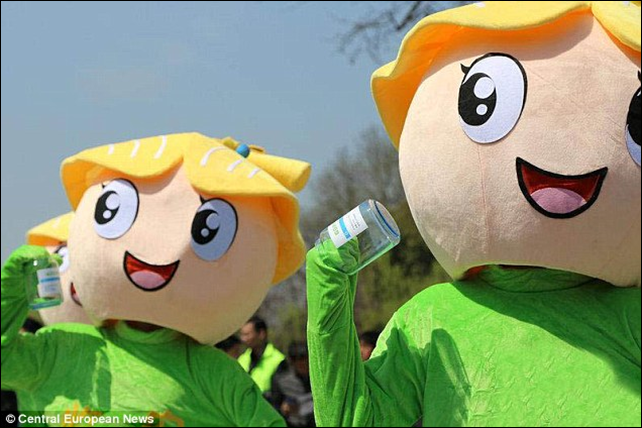Oxygen stations set up across China to provide relief from air pollution
By Suzannah Hills
30 March 2014 (Daily Mail) – It is one of the most polluted countries on earth. So it may come as little surprise that the latest fad in China is literally offering its city dwellers a breath of fresh air. Numerous fresh air stations have been set up in some of China’s most polluted cities. The stations are stocked with individual air bags which provide users with pollution-free fresh air. And they have proved to be a big hit with one air station in Zhengzhou city in central China’s Henan province which was inundated with visitors. Uniformed air hostesses hook up visitors to oxygen masks so they can breathe air sourced from the Laojun Mountain scenic spot in Luanchuan county, which is 80% green land, in Henan province. There was no shortage of takers as locals flooded to enjoy the free fresh air. User Feng Lin, 75, said: ‘The air is really good, but the time is too short. I had to stop too soon but it was really great until then.’ It comes after just three of China’s 74 cities met the official air quality standards, according to the Ministry of Environmental Protection in China. The air bags are China’s latest attempt to address its dangerous smog levels – described as an environmental crisis by the World Health Organisation – after canned and bottled air already hit the streets. The air stations follow on from last week when costumed characters called Oxygen Babies were giving away air bottles filled with air collected at the Tianmu mountain scenic spot in the county of Linan in Zhejiang province. The Oxygen babies have been touring the country, promoting the new products, which are currently free of charge, and were pictured in the city of Hangzhou in east China’s Zhejiang province.
Product manager Long Peng said: ‘The air in Tianmu mountain is so fresh that negative oxygen ion concentration is 3,300 per cubic centimetre, much higher than the normal level. The problem is that there are not enough negative ions in daily life. All the modern things we have generate an over abundance of positive ions that make us feel tired, depressed and irritable.’ But in Laojun, where the air bags are being distributed, park managers say the average negative oxygen ion concentration is 30,000 per cubic centimetre. In some places on Laojun Mountain, the average negative oxygen ion concentration can be 50,000 per cubic centimeter. The inspiration for the idea reportedly came from tourist shops near Mount Fuji in Japan, where cans of fresh air have been a huge success. During a National Congress meeting, China’s president, Xi Jinping, suggested Guizhou ‘sell cans in the future’, adding: ‘Air quality is now a deciding factor in people’s perception of happiness.’ However, it’s not the first time bottle air has gone on sale in China. Last year, Chen Guangbiao, who made his fortune in the recycling business and is a high-profile philanthropist, claimed to have sold 10 million cans in just 10 days, as pollution levels reached a record high. The move comes after the country’s biggest online travel agency and insurance firms joined forces to offer policies to tourists whose trips are blighted in being visually impaired by the pollution.


Air stations? Uniformed air hostesses? Oxygen Babies on tour?
China better start taking steps to improve its air pollution problems before they make the world sickly from their silly, almost juvenile attempts to help their citizens breathe easier.